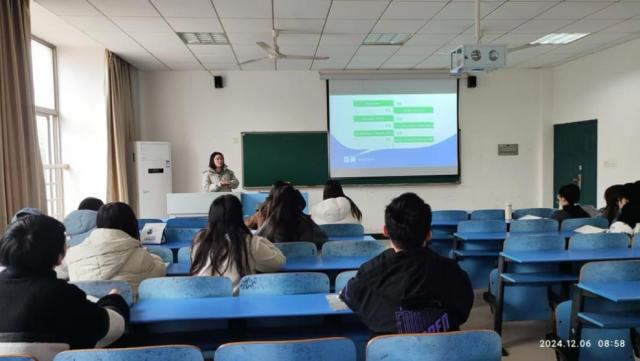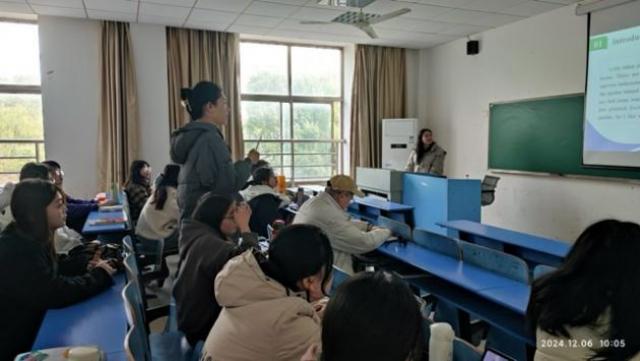Integration of Ideological and Political Education in Content Selection and Design 01. Design of Ideological and Political Objectives: Through academic exploration and research on the functions of discourse (theme - rheme), students will develop a rigorous academic attitude and enhance their critical thinking skills in analyzing discourse. While acquiring professional knowledge, students will be guided to form a correct worldview and cultivate their ability to interpret discourse through linguistic theories and perspectives. Emphasis will be placed on helping students reflect on the social value and practical significance of language. 02. Design of Integration for Ideological and Political Education: By analyzing the distribution of theme-rheme information in discourse, students will recognize that language is not only a tool for communication but also a crucial means of conveying authors’ preferences and ideologies. Through discussions on the characteristics of information distribution in discourse and the different motivations behind the variations in theme-rheme distribution, students will gain deeper insights into the role of language in shaping meaning. 03. Case Description: Guo Yueyi, a postgraduate majoring in English Linguistics from SFL, was invited to the classroom to share her insights on the theme-rheme functions in discourse. She highlighted that different distributions of theme-rheme lead to different interpretations of the discourse. Guo also shared her research on the distribution of theme-rheme information in economic journals. This unique “undergraduate-postgraduate collaboration” session helped students understand the concepts of theme and rheme, master the basic methods of theme-rheme analysis, and recognize the significant role of language in conveying information and intentions. This approach also enhanced students’ cultural confidence and sense of linguistic responsibility. Teaching Implementation Process 01. Overall Approach:
As a distinctive feature of this course, we organize an “undergraduate-postgraduate collaboration” activity every semester. By inviting postgraduate students to share their learning experiences, we aim to inspire undergraduates’ enthusiasm for linguistics. In this session, Guo Yueyi explained the theme-rheme functions in discourse and shared her research progress on the distribution of theme and rheme information in economic journals. Through lectures, case analysis, group discussions, and teacher summaries, students were able to grasp the concepts of theme and rheme, master the basic methods of analysis, and recognize the power of language and the social responsibilities of linguists. 02. Teaching Methods: Case-based teaching (the lecturer guides students in analyzing the distribution of theme-rheme in discourse), comparative teaching (students are encouraged to analyze the differences in information transmission and discourse intentions due to different theme-rheme distributions), group discussion (to foster teamwork and critical thinking skills). 03. Implementation Steps: Class Organization: Guo Yueyi’s presentation was primarily delivered through a PPT, supplemented with specific discourse examples to help students intuitively understand theme-rheme analysis. Interactive Sharing and Case Analysis: The session was organized in a group discussion format, with each group analyzing a text segment and sharing their findings. Guo’s clear and practical explanations, combined with real research cases, sparked students’ interest. Active Participation: Students were highly engaged in the case analysis, discussing enthusiastically and applying the theories they had learned to analyze the texts. Teacher Summary: The teacher summarized the session by linking it to the ideological and political objectives, guiding students to reflect on the relationship between information distribution, discourse structure, and writing intentions. 
Figure 1: Graduate student Guo Yueyi shared her progress on the research paper

Figure 2: Interaction between undergraduate students and Guo Yueyi after the group discussion Post-Class Reflection: Inviting graduate student to share her research made academic atmosphere more lively and significantly increased student participation. The integration of ideological and political elements was natural and effective, enhancing students’ cultural confidence and sense of linguistic responsibility while learning linguistic theories. 04. Utilization of Teaching Resources: In this case, the Chaoxing platform was used to achieve efficient and interactive sharing of teaching materials and learning experience. The PPTs prepared by the teacher and the postgraduate student, combined with specific discourse examples, helped students intuitively grasp the theory and application of theme-rheme analysis. Relevant academic papers and research materials on theme-rheme analysis were also shared via the platform for students’ pre-class preparation and in-depth post-class study. The group discussion segment was conducted online, facilitating group interaction and peer evaluation, and enhancing students’ sense of participation and collaboration. Additionally, the postgraduate student’s sharing of her research experience further inspired students’ interest in linguistic research. Through the comprehensive use of these resources, students not only mastered the basic methods of theme-rheme analysis but also deeply recognized the power of language and the social responsibilities of linguistic researchers. Teaching Outcomes Knowledge Acquisition: Students understood the theory of theme-rheme and were able to apply it in discourse analysis. Skill Enhancement: Through case analysis, students improved their ability to analyze discourse, especially in interpreting the structure of textual information. Ideological and Political Effectiveness: Students recognized that language is not just a communication tool but also a carrier of authors’ intentions and ideologies. This awareness strengthened their sense of responsibility and mission in language learning. By Zhu Jianping and Zhang Shanjun
|